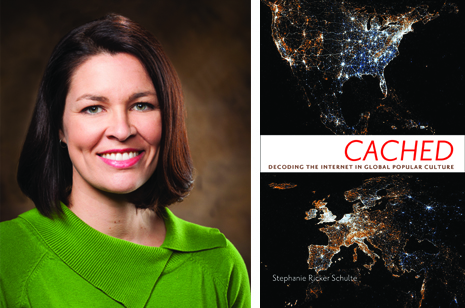FAYETTEVILLE, Ark. – The Internet needs to be recognized not only as a technology, but also as a cultural and political formation, argues Stephanie Ricker Schulte in her new book, Cached: Decoding the Internet in Global Popular Culture. Schulte is assistant professor of communication in the J. William Fulbright College of Sciences at the University of Arkansas.
“Technologies aren’t neutral,” she said. “We bring ideas to them. Yet a lot of research has examined the Internet as a technology that existed outside culture and policy. I wanted to add its cultural and political roots to the conversation. Culture embeds itself in technology.”
The book details how policy decisions shaped the Internet and how popular understanding of the new technology shaped policy decisions, according to Schulte.
The U.S. military invented the Internet in 1969. Academics long thought of it as only a piece of technology: a fiber optic cable that moved bits of information from one computer to another.
But the Internet should be considered a cultural location, she said.
“Most Internet scholars as well as contemporary journalists and policymakers view the Internet as self-evidently American, democratic and capitalist,” Schulte said. “They present Internet adoption as inevitable and the free market and corporate forces as its natural regulators. In contrast, this book illustrates how voices — both in the United States and abroad — helped to construct the Internet as such in part through cultural representations and policy initiatives.”
The book examines the ways in which American, European and Middle Eastern popular culture producers, policymakers and news media made sense of the emergence and expansion of the Internet between the 1980s and 2000s. They imagined the Internet in conflicting terms, including “a state-sponsored war project, a toy for teenagers, a national security threat, a new democratic frontier, an information superhighway, a virtual reality and a major player in global capitalism,” according to Schulte.
“These visions had material consequences and, if not always in simple or direct ways, helped shape the development of the technology,” she said. “When we talk about the Internet, we’re often talking about globalization or citizenship or democracy, or other things, and we’re doing it through a lens of technology. I’m interested in the way we talk about the Internet and the way we talk through the Internet.”
Cached also analyzes how politics and policies influenced the development of popular ideas about the Internet as a medium and site of corporate investment.
The Computer Fraud and Abuse Act of 1984, which remains the precedent for regulatory Internet policy, was crafted after a congressional committee screened the 1983 movie WarGames, which starred Matthew Broderick as a teenaged computer hacker who accidentally brings the world to the brink of global thermonuclear war.
WarGames led to a discussion that cast both Internet technology itself and its users as rebellious teenagers in need of parental control, according to Schulte.
“The final policy tended toward the lenient pole,” she writes. “Ultimately, the teenaged technology discourse allowed policymakers to equate government Internet regulation with parental guidance rather than the suppression of democracy and invention.”
Over the last three decades, the Internet developed in accordance with larger changes in culture and policy as much as with the intrinsic capabilities of technology, according to Schulte. She also contrasts its cultural and political representations in the United States, Europe and, to a lesser extent, the Middle East.
Cached is published by New York University Press.
Contacts
Stephanie Ricker Schulte, assistant professor, communication
J. William Fulbright College of Arts and Sciences
479-575-3769,
Chris Branam, research communications writer/editor
University Relations
479-575-4737,
